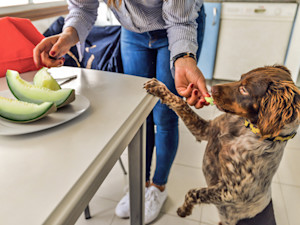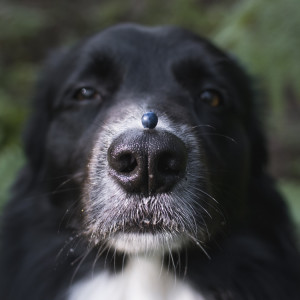Can Dogs Eat Coconuts?
To quote Scar, “I’ve got a lovely bunch of coconuts.” But can dogs snack on them?
Did you know the coconut is not even a nut? A coconut comes from the stone fruit family, and you can find coconuts growing on trees in coastal tropical regions. They have a hard outer shell and a delicious fruit inside.
So, can your dog take a bite of that fruit? Drum roll… yes! According to veterinarian Dr. Nell Ostermeier, “Coconut flesh is not toxic to dogs, but do not feed [them] the shell.” Coconut can be fed as a treat to your pup. As always, when feeding your dog human foods, you should consider several things.
Nutrition facts: Coconuts for dogs
Are coconuts good for dogs?
“Coconut can have the potential to boost your dog’s immune system, decrease inflammation, and benefit your dog’s skin,” Dr. Ostermeier says. “But before starting, you should talk with your veterinarian about whether your dog would benefit from coconut oils or adding some of the flesh to their diet.”
The fruit of a coconut is high in fat. Foods high in fat can be dangerous for dogs, and you must take serious care when feeding them to your pup.
How much do you spend on your pet per year?
The high-fat content in coconut flesh can cause diarrhea or weight gain for dogs, and so should be fed in moderation. Foods with high-fat content can cause pancreatitis, which can be a serious illness for dogs; it can be extremely painful or even life-threatening. If your dog overeats foods high in fat, their pancreas can swell. This swelling can cause tissue damage. Many dogs with pancreatitis can go on to live a normal life, but those who have severe pancreatitis can suffer lifelong issues.
Can dogs eat coconut?
Yes, dogs can eat coconut. There are a variety of ways you can serve coconut to dogs. For instance:
As a shaved topping over their food (this will help with overfeeding).
You can also give them the recommended amount of coconut oil as a topping on their food.
Are coconuts completely safe for dogs?
Do not give your dog a whole coconut. The shell and husk can cause digestive upset and be hard to swallow, causing issues on the way down.
Only a small amount of coconut water is good for dogs — about a teaspoon for small dogs and a tablespoon for large dogs, given once a week. Coconut water contains electrolytes, which are beneficial for your dog on a hot day. It is an excellent source of potassium, but because of that, dogs with certain kidney diseases should avoid it. There is no fat in coconut water, but there may be added sodium to look out for.
Other fruits that are safe for dogs
Papayas are an excellent source of vitamins A, C, E, and K.
With their high water content, honeydew can be a good source of hydration for your pup.
Blueberries are packed with antioxidants, and make a great treat for dogs.
Other fruits that not safe for dogs
All grapes and raisins are toxic to dogs and should be completely avoided.
The skin and seeds of persimmons can cause life-threatening stomach blockages in dogs.
Avocados contain persin, which can be possibly toxic to dogs.
The bottom line: Can dogs eat human food?
Coconut is a delicious treat to eat, and it is nice to know you and your pup can enjoy them together.
FAQs (People also ask):
Is there a certain amount of coconut dogs should or should not eat?
Coconut flesh is not toxic to dogs but can lead to diarrhea if fed too much, due to its high-fat content. The high-fat content could also cause pancreatitis and weight gain if fed in large quantities. It is best fed to dogs as a treat in moderation and as a shaved topping on their regular food. You should talk with your veterinarian before adding it to their diet. Do not feed them the shell.
Is coconut good for dogs?
Coconut can have the potential to boost your dog’s immune system, decrease inflammation, and benefit your dog’s skin. But before starting, you should talk with your veterinarian about whether your dog would benefit from coconut oils or adding some of the flesh to their diet.













